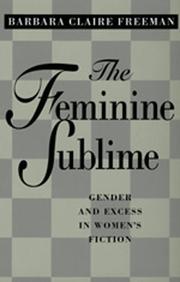| Listing 1 - 2 of 2 |
Sort by
|
Book
ISBN: 1299474802 022603884X 9780226038841 9781299474802 9780226038704 Year: 2013 Publisher: Chicago, Illinois The University of Chicago Press
Abstract | Keywords | Export | Availability | Bookmark
 Loading...
Loading...Choose an application
- Reference Manager
- EndNote
- RefWorks (Direct export to RefWorks)
In his sixth collection, Mark Halliday continues to seek ways of using the smart playfulness of such poets as Frank O'Hara and Kenneth Koch to explore life's emotional mysteries-both dire and hilarious-from the perpetual dissolving of our past to the perpetual frustration of our cravings for ego-triumph, for sublime connection with an erotically idealized Other, and for peace of spirit. Animated by belief in the possible truths to be reached in interpersonal speech, Halliday's voice-driven poetry wants to find insight-or at least a stay against confusion-through personality without being trapped in personality. History will leave much of what we are on the threshing floor, Halliday notes, but in the meantime we do what we can; let posterity (if any!) say we rambled truly. Forward Prizes for Poetry: Highly Commended for 'Classic Blunder' and 'Lois in the Sunny Tree'
American poetry. --- Poetry. --- Poems --- Poetry --- Verses (Poetry) --- Literature --- American literature --- Philosophy --- poetry, collection, literature, creative writing, contemporary, lois in the sunny tree, classic blunder, triumph, other, sublime, connection, desire, passion, yearning, erotics, sexuality, peace, speech, dialogue, communication, voice, personality, ramblings, memory, reminiscence, childhood, nostalgia, depression, modern life, anxiety, truth.

ISBN: 9780585181764 0520919092 0585181764 9780520919099 9780585181769 0520088638 0520208889 Year: 1997 Publisher: Berkeley, Calif. University of California Press
Abstract | Keywords | Export | Availability | Bookmark
 Loading...
Loading...Choose an application
- Reference Manager
- EndNote
- RefWorks (Direct export to RefWorks)
The Feminine Sublime provides a new and startling insight into the modes and devices employed in the creation of women's fiction since the eighteenth century. Barbara Claire Freeman argues that traditional theorizations of the sublime depend upon unexamined assumptions about femininity and sexual difference, and that the sublime could not exist without misogynistic constructions of "the feminine." Taking this as her starting point, Freeman suggests that the "other sublime" that comes into view from this new perspective not only offers a crucial way to approach representations of excess in women's fiction, but allows us to envision other modes of writing the sublime. Freeman reconsiders Longinus, Burke, Kant, Weiskel, Hertz, and Derrida while also engaging a wide range of women's fiction, including novels by Chopin, Morrison, Rhys, Shelley, and Wharton. Addressing the coincident rise of the novel and concept of the sublime in eighteenth-century European culture, Freeman allies the articulation of sublime experience with questions of agency and passion in modern and contemporary women's fiction. Arguments that have seemed merely to explain the sublime also functioned to evaluate, domesticate, and ultimately exclude an otherness that is almost always gendered as feminine. Freeman explores the ways in which fiction by American and British women, mainly of the twentieth century, responds to and redefines what the tradition has called "the sublime.".
Aesthetics, Modern --- Aesthetics, Modern. --- American fiction --- Authorship --- English fiction --- Femininity in literature. --- Feminism and literature. --- Sex role in literature. --- Sublime, The, in literature. --- Women and literature --- NON-CLASSIFIABLE. --- Literature --- Femininity (Psychology) in literature --- Modern aesthetics --- Great Britain --- United States. --- Women authors --- History and criticism. --- Sex differences. --- History --- Great Britain. --- History. --- Literature and feminism --- 20th century western literature. --- agency. --- american womens fiction. --- british womens fiction. --- edith wharton. --- edmund burke. --- ethics of risk. --- femininity. --- feminist theory. --- gender studies. --- immanuel kant. --- jacques derrida. --- jean rhys. --- kate chopin. --- literary criticism. --- literary theory. --- mary wollstonecraft shelley. --- misogynistic constructions. --- other sublime. --- passion. --- quality of greatness. --- sexual difference. --- the feminine. --- the sublime. --- toni morrison. --- women and gender studies. --- womens fiction.
| Listing 1 - 2 of 2 |
Sort by
|

 Search
Search Feedback
Feedback About UniCat
About UniCat  Help
Help News
News